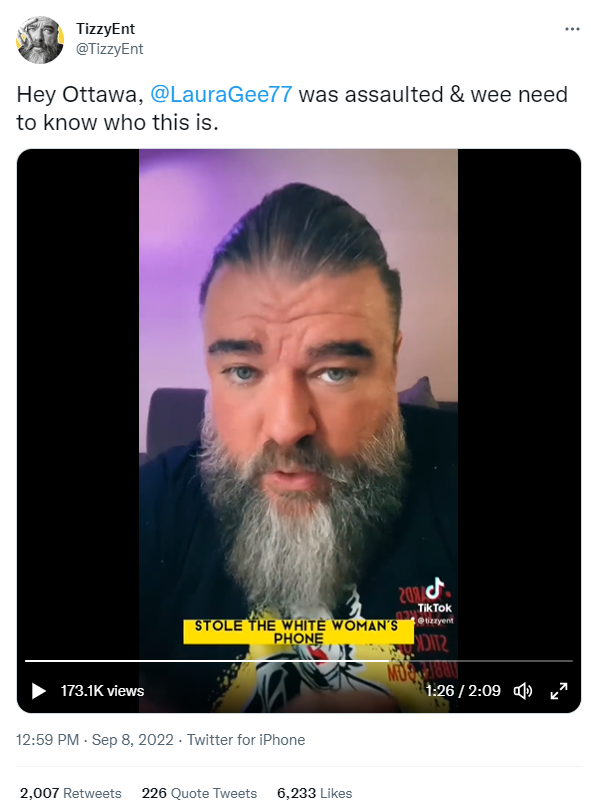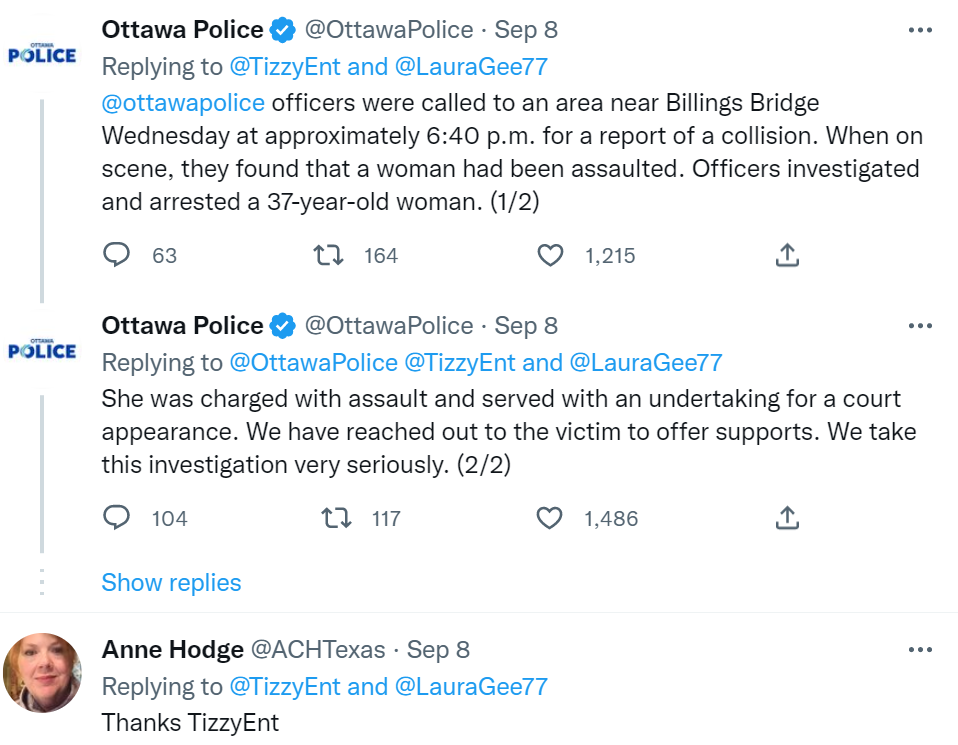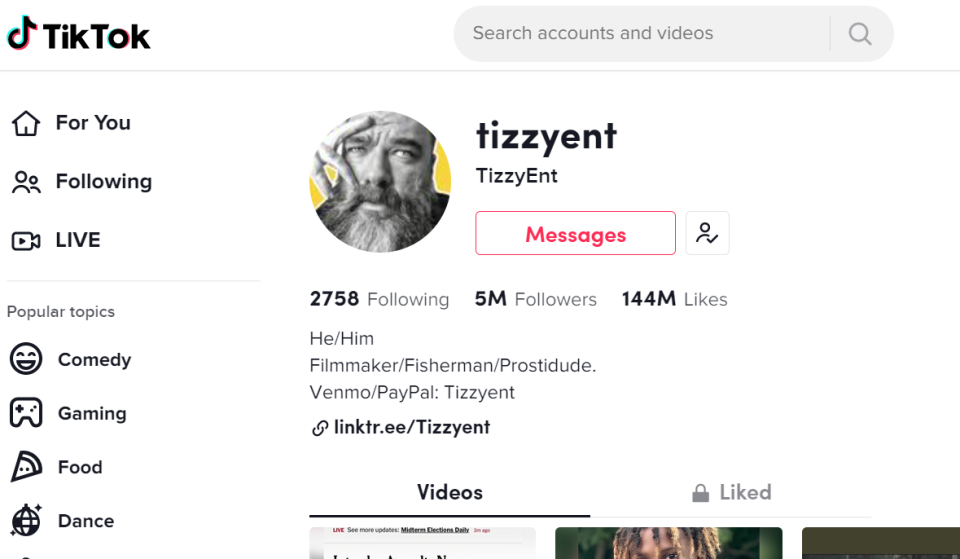TikToker uses massive reach to track down racist, homophobic, suspects, tries to keep mob in check
When a popular TikToker re-posted a video showing the attack of an Indigenous woman in Canada and asked police what they were doing about it, the department responded online within hours.
Ottawa police quickly explained they had arrested a 37-year-old woman for the attack, charged her with assault and that they “take this investigation very seriously.”
Though the victim’s video had amassed a huge number of views on its own, it wasn’t until TikToker Michael McWhorter – whose handle is @tizzyent – posted about it that police publicly addressed the attack.
McWhorter, whose full-time job is editing and directing movies and music videos, has gained five million followers by calling out apparent racist, homophobic, violent or otherwise illegal behavior. Oftentimes the videos he posts are an effort to track down perpetrators caught on film, either to report them to police or as a way to call them out in our modern-day village square.
"I do not get joy out of being like, 'This horrible thing happened to these poor people and this is the person who did it,'" McWhorter, 45, said from his home in central Florida this week. "I do it to try and help people who've been victimized and that's it. I feel an obligation. If I can help, why wouldn't I?"
A butterfly urn and a battered Bible: The sad scavenger hunt after Hurricane Ian

McWhorter is part of a growing number of online creators drawing attention to injustice and helping hold police accountable for incidents that may have gone unanswered before the internet age.
"It is very popular and is becoming more and more popular," said Eric Miller, a law professor specializing in criminal procedure and policing at Loyola Law School in Los Angeles.
But that growth in popularity can come with risks.
While some creators can help police track down people committing crimes, an internet mob isn't always productive, Miller said.
Sometimes they can misidentify wrongdoers or otherwise innocent people can get caught up in the frenzy.
'The bird is freed': Elon Musk now owns Twitter. What's next for the social media giant?
From lip syncing to launching investigations
In McWhorter's case, he said he never set out to become a creator who exposes injustice. In fact, when he first joined TikTok in 2018, he was doing lip sync videos like so many of its initial users. Then one day last year McWhorter made a video acting like he was shaving off his beard, which became a trend and attracted 200,000 new followers.
With a larger audience, McWhorter started exposing misinformation that proliferated on the app, particularly around politics. He gained some national media attention last August when he helped expose a New Jersey woman who was selling fake coronavirus vaccination cards on Instagram and fraudulently entering people into New York's immunization database.
In his video, McWhorter shares private messages he exchanged with the woman on Instagram in which she explained how she was getting unvaccinated people entered into the database.
Since then, he's gone after a man attacking homeless people in Los Angeles, resulting in an arrest, someone threatening women with violence at a political rally and others hurling racial or homophobic slurs. He's called out others engaging in road rage or throwing angry tantrums over mask requirements.

Before social media creators who can reach millions started getting involved, oftentimes police couldn't do much with a video submitted by a victim.
"A lot of times it seems the response from law enforcement is, 'Well, yeah, it's great to have that video, but we don't know who that person is. And without knowing who it is, there's not a lot that we can do,'" McWhorter said.
That's where he and his followers come in.
"While the world is a great big place with a lot of people in it, the internet is kind of like one big, small town," he said. "If you do something bad in a small town, everyone knows that you did it, it spreads very quickly. The internet is kind of like that. If you do something terrible on the East Coast, but you grew up on the West Coast, and a video goes online and gets traction and gets interaction, people who went to high school with you will see it and will say, 'I know who that person is.'"
When innocent people become targets
But those identifications aren't always accurate and the internet, like a game of telephone, has a tendency to twist things.
For instance, when McWhorter re-posted a woman's video and called out a Virginia fish store owner for allegedly attacking her, two similarly named businesses were flooded with angry phone calls and bad reviews.
“It’s been devastating emotionally,” one of the innocent business owners, Adam Oberheim, told WSLS-TV in Roanoke, Virginia.
In a follow-up video to try to help the innocent businesses, McWhorter said he had "made it a point to say who it was and where it was and the exact name so that people wouldn't go looking for any business ... and give them bad reviews online or call them with hate messages.
"But people are doing that so I'm going to try to use my platform to get the word out," he said.
He told USA TODAY that the original video he had re-posted had a life of its own and he thinks most of the misguided anger came from people who hadn't seen his video specifying the exact business name, owner's name and location of the store involved.

Though it can be a dangerous game, McWhorter said he feels like the net benefit far outweighs any potential negatives, including the personal cost of publicly exposing wrongdoing, like the death threats he's gotten.
He points to a video he re-posted showing a white man grabbing a young Black man with mental disabilities by the neck in Milwaukee over a stolen bike he had nothing to do with.
Now, police are investigating the incident and thousands of people have made donations to help the young man.
"This young man had this experience with one bad person that is terrible and traumatic," McWhorter said. "But if nothing else, here's almost 3,000 people who came and said, 'You matter, we care about you' ... This kid is facing a completely different life than he was facing before all this happened because a bunch of people said, 'What happened to you wasn't right, and we want to support you and help you.'"
"That's the thing that keeps me going."
More coverage from USA TODAY
Delta-9 THC: What looks like pot, acts like pot, but is legal nearly everywhere?
Meet Kala Baybayan Tanaka: A Hawaiian navigator who helped shape Disney's 'Moana'
From TikTok to CSI: Kentucky man posed as a dead body on TikTok for 321 days. Now he's going to be on 'CSI'
Want to delete Twitter your account?: Step-by-step guide to permanently remove your account.
This article originally appeared on USA TODAY: TikToker Michael McWhorter videos crowd source social justice online

